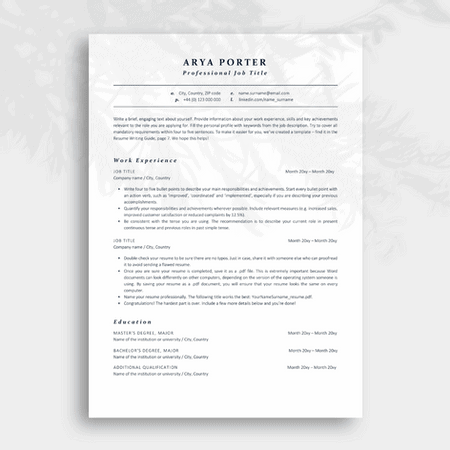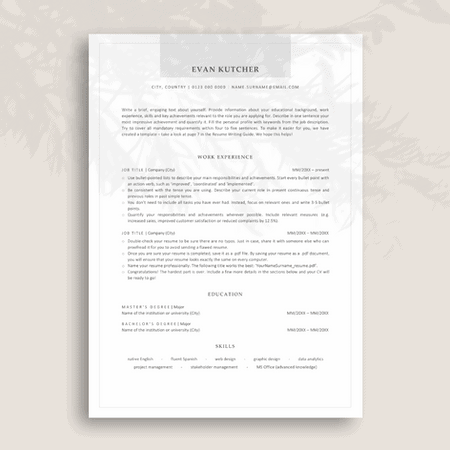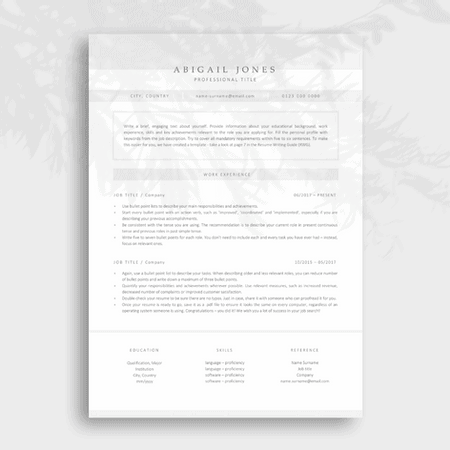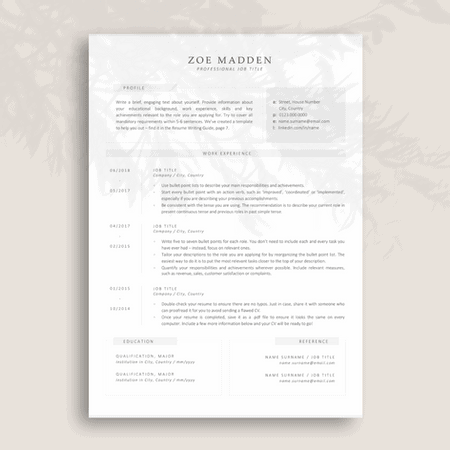HR Administrator: Resume Writing Guide & Sample Resume
- Ana

- Apr 29, 2021
- 15 min read
Updated: Jul 2, 2021
Human Resources Administrators (also called HR Coordinators or HR Assistants) are behind-the-scenes professionals who make things happen in the HR world. They deal with HR queries from employees and external collaborators, and are involved in a variety of HR projects, from recruitment to learning and development.
Due to their scope of responsibilities, HR Administrators are expected to be a jack of all trades in HR!
A great HR administrator is a go-to person and the main collaborator for HR colleagues who need help with ongoing projects or organisation of an event. Also, they are the main point of contact for all employees who need support with their contract, absences, HR policies and much more.
If you are looking for an HR administrator job, you may be responsible for: maintaining employees’ data, supporting various HR projects, organising HR events (from team-buildings and trainings to job fairs) and answering employees’ queries about HR-related topics. In this role, you’ll be the one juggling and coordinating all the pieces of the HR-puzzle.
So, if you are about to apply for an HR Administrator vacancy, you need a resume that reflects all the skills the company will be looking for, including:
Out-of-this-world organisation and time-management skills
Reliability, accuracy and attention to detail
Strong collaboration, communication and interpersonal skills
>> Want to skip the reading, jump to the action and have your job application ready in 15 minutes? Check out 45+ resume templates made by hiring professionals! <<
We’ve created a step-by-step guide to help you create such a resume. With this guide, in the next 10 minutes, you’ll learn how to:
► write a perfect professional profile summary for the position of HR Administrator
► quantify your responsibilities and achievements
► format your resume
► overall, create an HR administrator resume that stands out from the crowd and gets you hired
You'll also get:
► a template and sample for a personal profile summary
► a list of 20+ action verbs tailored to an HR Administrator’s responsibilities
► five examples of metrics to quantify your achievements
► 50+ actionable tips coming from experienced recruiters and resume writers
► a full and FREE HR administrator resume example
Let’s dive into it!
STARTING POINT: Job Description
Everything you need to cover in your resume is written in the job description (i.e. job ad, job posting).
So, before you start crafting a great HR Administrator resume, go through the job description a few times. Make sure you understand all the responsibilities and requirements specified there.
To find the most important information, look for sections called ‘Requirements’, 'Person specification', 'Essential and desirable skills' or 'What are we looking for?'.
The content of the job description will likely sound like this:
We are looking for an HR Administrator to support our Human Resources department. You will act as the first point of contact for HR-related queries from employees and external partners.
Your main administrative duties include maintaining personnel records, managing HR documents (e.g. employment records and onboarding guides) and updating internal databases. To be successful as an HR Administrator, you must have experience with HR procedures and be able to juggle various administrative tasks in a timely manner. Ultimately, you should be able to ensure our HR department supports our employees while conforming to all applicable labor laws.
HR Administrator Responsibilities:
Organise and maintain the stored data about employees and HR-related information, e.g. vacations, fluctuation, absence
Support the recruitment processes and prepare HR documents, including employment contracts and new hire guides
Liaise with external partners, such as insurance vendors, and ensure legal compliance
Assist the payroll department by providing relevant employee information (e.g. leaves of absence, sick days and work schedules)
Prepare regular reports and presentations on HR metrics (e.g. turnover rates)
Answer employees’ queries about HR-related issues
Helping with various arrangements internally; from travel, team-buildings, training events and processing expenses
Participate in HR projects (e.g. help organize a job fair or other employer branding events)
Requirements:
Degree in business, human resource management or any other related field
Practical experience in a similar position, as an Administrator or HR administrator’s assistant
Understanding various HR software systems, like HRIS or HRMS
Ability to efficiently use computer software, such as Word, PowerPoint and Excel
Excellent organisational skills and ability to prioritise
Reliable team player with strong communication skills
Now that you have seen this, we can start working on a resume that proves to HR managers and recruiters that you’re the one for the job!
Step 1. Start with your contact details
First things first - open a new Word or Pages document and write down your name and surname.
They are the first thing employers will read on your CV and you want them to be seen and remembered. They should be easy to find, so put them at the top of the page. Alternatively, you can put them at the bottom for a more unconventional approach.
Then, tell employers how to reach you. Below your name and surname, write down your location, phone number and email address. Make this part short, straightforward and professional – without too many phone numbers or emails to choose from, and with a formal-sounding email address.
Contact information on your resume should look like this:
NAME SURNAME City, Country / +44 (0)203 000 000 / name.surname@email.com
It’s also a good idea to provide links to your social media profiles, such as LinkedIn, Twitter or Facebook.
However, it’s not mandatory. Do it only if your profiles are appropriate, and you feel that they are going to add value to your job application helping you come across as a motivated and professional candidate. Otherwise, it’s better to keep them off your resume.
Step 2. Write a perfect HR Administrator personal statement
[a word-for-word template included!]
Unknowingly, many candidates lose the reader’s interest in the very first sentence in their resume.
The reason is that they start with a vague opening about their career aspirations that doesn’t add any value – it feels like it’s there just to fill the space.
This ‘full-of-buzzwords-but-meaningless’ sentence usually sounds something like this:
'As a self-motivated professional, I am looking for a new challenging job opportunity to develop myself further and build on my skills and knowledge in a new role.'
This introduction doesn’t actually say anything about your expertise. As such, it doesn’t help you brand yourself as an HR professional and it doesn’t grab the reader’s attention. In other words – it’s made to fail.
To avoid starting your resume with an opening sentence that sends your application into the black hole of “thanks-but-no-thanks” resumes, kick your CV off in the most effective way – write a personal statement tailored to the role of your interest.
A personal statement is essentially a summary of your career.
When done correctly, this section can help you position yourself as an expert and a strong candidate right from the start, which consequently increases the time that employers will dedicate to your resume and your chances of being invited to an interview.
To do it right, fill in the template below:
<adjective 1> and <adjective 2> <current job title> with <number> years of experience in <industry 1> and <industry 2>. Strong <key strength 1> combined with the ability to <skill 1> and <skill 2>. Extensive experience of <area of expertise 1>, <area of expertise 2> and <area of expertise 3>. <Insert a quantified achievement>. Currently looking to broaden experience and apply the existing skillset in <specific industry/company/role>.*
*The last sentence is optional.
When you include relevant keywords here, it will sound something like this:
Adaptable and tech-savvy HR Assistant with 4 years of experience in providing administrative support to HR departments of retail companies. Strong organisation skills combined with attention to detail and ability to maintain high volume of data with accuracy. Experienced in maintaining personnel files, supporting HR projects, and being the main point of contact for HR queries. Analysed HR data and proposed solutions that resulted in $50,000 saved per year.
Feel free to play around with the keywords to make it perfect for the role you are applying for.
Step 3. Structure your work history
The work history or the professional experience section is the most important part of your resume.
Both structure and the content of this section determine how you resume is going to be perceived by employers.
When it comes to structuring this part of a resume, the recent information is more relevant and should be kept closer to the top. So, apply reverse chronology, starting from your current job and then listing older ones.
For all jobs you include in your resume, you need to have the following information:
name of the company
your job title
time-frame (starting date - ending date)
description of your responsibilities
Also, pay close attention to the formatting. Choose one formatting style and stick to it.
For example, if you decide to write the time-frames on the right-hand side of the page, keep them there throughout the whole resume. Don't move them to the left side, middle or anywhere else.
Additionally, if you decide to write it in the following form:
08/2016 - 07/2019
....don't mix it with:
May 2014 - July 2016
from 2014-05-15 to 2016-07-15
or any other option
Even though this might seem like a minor thing in your resume, paying attention to such things is the best evidence of your attention to detail, which is one of the things employers expect from the best candidates for the HR Administrator role.
Step 4. Describe your responsibilities and achievements
When it comes to content of the work history section, every word you include here counts. Therefore, the descriptions of your responsibilities and achievements need to be nothing less than perfect.
The key to writing the best content here is in tailoring your job descriptions to the job you are applying for and keeping only relevant information. Going back to the job description, here is the list of responsibilities for an HR administrator:
HR Administrator Responsibilities:
Organise and maintain the stored data about employees and HR-related information, e.g. vacations, fluctuation, absence
Support the recruitment processes and prepare HR documents, including employment contracts and new hire guides
Liaise with external partners, such as insurance vendors, and ensure legal compliance
Assist the payroll department by providing relevant employee information (e.g. leaves of absence, sick days and work schedules)
Prepare regular reports and presentations on HR metrics (e.g. turnover rates)
Be the main point of contact and answer employees’ queries about HR-related issues
Helping with various arrangements internally; from travel, team-buildings, training events and processing expenses
Participate in HR projects (e.g. help organize a job fair or other employer branding events)
In your resume, you need to prove to employers that you can be successful at performing all these tasks. On top of that, since you are looking for a job in HR administration, your resume needs the be the best evidence of your top-notch organisation and communication skills.
If you want to showcase skills, a job description that looks like this won’t be enough:
HR Administrator ABC company, 2017 - today
Key responsibilities:
maintaining employee’s data
supporting HR projects
answering employees’ queries
It simply doesn’t say anything about what you have done and – more importantly – what you achieved.
Instead, describe your responsibilities like this:
HR Administrator ABC company, 2017 - today
Key responsibilities:
Provided HR administrative assistance to 30+ HR staff in Recruitment, Learning & Development and Payroll
Maintained personnel files for 500+ employees, which included handling employment verifications, reviewing applications, setting up testing, and interviewing prospective employees
Saved $15,000 annually in payroll fees by researching, negotiating and implementing a new payroll vendor
Managed HRIS systems (local and corporate), performed data entry, and ensured accuracy of data for all workforce/employee changes
Established and maintained effective relationships with internal and external stakeholders including employees, line manager, and third-party providers
Don't worry if you can't capture all the requirements in your employment overview. It's likely impossible, especially if you didn't have exactly the same job in the past.
Instead, sprinkle as many keywords or matching verbs from the job ad as you can all over your resume - in the personal profile section at the beginning, in the job descriptions of different roles, and in the list of your skills.
There a few additional rules that should be applied:
a. Use bullet-pointed lists.
b. Start each bullet point with a verb.
c. Be consistent with the tense you are using.
d. Quantify your responsibilities or achievements.
A. USE BULLET-POINTED LISTS
Describing responsibilities in bullet points is the gold standard of resume writing, as they are quicker, easier and more user-friendly to read.
Write five to seven bullet points for your current job.
As you go down memory lane and back to your older jobs, reduce the number of bullet points. Two to three bullet points will be enough for the jobs from the beginning of your career.
Wondering how you can describe everything you have done within three to seven bullet points?
The key is in including only information relevant to the job.
Think about every word and bullet point you have written down. Assess the value of each sentence in your resume by asking yourself if it shows valuable experience, achievement, knowledge or a skill that you could use in the job. If the answer is "no", "not sure" or "maybe", tweak it or remove it.
B. START EACH BULLET POINT WITH A VERB [20+ action verbs included!]
Bullet points should be concise, straightforward and focused on what you did, not on what the role was about.
To write such bullet points, avoid repetitive phrases at the beginning of each bullet point, such as ‘I am responsible for/in charge of/I did’. Also, avoid starting with nouns. For example, if you just write ‘project management’, it won’t mean a lot to readers, as project management includes a wide variety of tasks.
Instead, start bullet points with action verbs.
The best action verbs depend on your experience and industry.
For example, for an HR Administrator resume, it’s obvious that you need to use power verbs that highlight your stellar communication and organisation skills, such as:
Communication skills
Advised
Answered
Communicated
Corresponded
Consulted
Defined
Informed
Liaised
Negotiated
Presented
Suggested
Organisation skills
Arranged
Categorised
Executed
Prioritised
Coordinated
Managed
Maintained
Organised
Planned
Prepared
Supported
Scheduled
C. BE CONSISTENT WITH THE TENSE YOU ARE USING
If you are talking about your previous employment or past achievements, use past simple tense – organised, informed, prepared. When describing your current role, use present continuous tense – maintaining, arranging, scheduling.
D. QUANTIFY YOUR RESPONSIBILITIES AND ACHIEVEMENTS (examples included)
If there is one thing that can take your resume to the next level, it’s quantifying your achievements.
Numbers help readers understand the impact you’ve made in your position; they grab attention and make resumes sound much stronger.
Below you can see the same job description we worked on above, without any numbers:
Provided HR administrative assistance to HR staff in Recruitment, Learning & Development and Payroll
Maintained personnel files, which included handling employment verifications, reviewing applications, setting up testing, and interviewing prospective employees
Researched, negotiated, and implemented contract with a new payroll vendor
It’s still ok, but it doesn’t sound as strong as it could.
For jobs in HR Administration, include some of the following metrics in your resume:
the number of employees or HR staff you supported
the average number of employees’ queries you answered per day, week or month
the number of new hires you managed and supported
time or money saved through the processes or practices you streamlined or improved
Step 5. Include your education
Qualifications are an important part of a resume. Here are a few basic rules for listing your education:
Include only the following information: the type of degree you earned, your major, the name of your school or college, the year you graduated.
Start with your highest degree first.
Add other degrees in reverse-chronological order.
If you finished college, don’t add your high school information.
Add other training, qualifications or certificates only if they are relevant to the job.
Other information, such as GPA, should be included only if requested, or if you are a recent graduate with an impressive GPA. Otherwise, no one will pay attention to it.
Additionally, if you are currently undergoing a professional qualification, don’t forget to specify the expected date of graduation. It is important info that shouldn’t be omitted. Simply state when the expected graduation/certification date is.
Step 6. List relevant skills
The skills section of your resume includes your abilities that are related to the jobs you are applying for.
This is not a mandatory part of a resume. However, if you want to highlight additional skills that you didn’t have a chance to apply or show in your previous jobs, this can be the right place.
Here are some relevant skills to include in this section for a job as an HR Administrator:
Management of people you interact with: employees, clients, colleagues, vendors, contractors, regulators etc.
Tools used: Excel, Word, PowerPoint, HRIS, HRMS, other HR software
Projects you contributed to: recruitment, onboarding, training, payroll, HR policies and procedures
Step 7. Prepare a reference list
Skip the "References available upon request" sentence at the bottom of your resume.
Employers assume you have references and will ask for them, if necessary. And the most common practice is to request a reference list at the end of the hiring process, not upfront.
However, even though you don’t need to include them in your resume, we wouldn’t recommend waiting for the last minute.
Prepare a reference list in advance, securing at least 3-5 references.
Bear in mind that references should be people who have supervised you or had a chance to collaborate with you in an academic or hands-on setting like an internship, job or volunteer position, as they can advocate about your potential for success.
In a new document (separate from your resume), sum up the following information about your references:
name and surname
their job title and company/institution
contact details – phone number and email address
Bonus tips:
A. Give your references a heads up
Before you add someone’s name on the list, ask your references for their approval to avoid any awkward situations. Additionally, advise them if there is anything they need to know in case your potential employer reaches out to them to avoid any confusion (e.g. if you have changed surname in the meantime since you have worked with them or if your current employer is unaware of the fact that you are actively looking for a job, so this needs to stay confidential).
B. Match formatting style
For a polished look, use the same design and formatting style on your references list that you used for your resume. Having matching documents will help you come across as a well-prepared, detail-orientated and professional candidate.
Step 8. Polish up formatting
Up until this point, you have been working on the content of your resume.
Now let’s put a cherry on top by polishing up the layout!
Here, little things make a big difference. Choices about font, spacing, margins and alignment affect the overall impression your application makes on the hiring manager. Without the proper formatting, the content loses its edge.
>> You can do it on your own. Or... you can save precious time and download a ready-made resume template and have your job application ready in 15 minutes! <<
Here are some actionable tips that can help:
A. Font
Select a professional, readable font for the body of your resume. Avoid too complex, unprofessional or hard-to-read fonts. Choose between Calibri/Calibri Light, Arial, Corbel, Cambria, Georgia, Source Sans Pro/Light.
Another factor in making your words highly readable is setting an appropriate font size. Generally, you should stay between 10 and 12 points.
B. Headings
Employers should be able to navigate through your resume with ease and they need to know where to look for specific information at first glance.
Differentiating the headings of each section in a professional way can help. You can:
● Write section letters in capital letters
● Use a “bold” font on your section headers
● Increase the size of your section header fonts to 12, 14 or 16 points
C. White space
Last, but not least, an element that contributes to the readability of your resume is the amount of white space - an area of your resume that remains unused when separating sections and paragraphs of text.
Lack of sufficient white space can make your resume look cluttered and disorganised, whereas too much can leave your CV feeling bare and lacking in content.
So, to make a resume that's easy on the eye, it’s important to achieve the right balance between white space and content by adjusting the following:
Spacing: If your resume looks crammed, increase the spacing between lines from 1.0 pt to 1.15 pt.
Margins: Margins (white space around the content) will depend on the amount of text you have. They should be between 0.5’’ to 1’’. Play around with it until you get a layout that is easy on the eye.
Alignment: The most common recommendation is to align your text to the left. An alternative solution is to justify it (align both to the left and right distributing your text evenly between margins). This depends on your preferences. The only option that needs to be ruled out is centering the whole content – it’s OK for headings, but not for the body of a resume.
And that’s about it!
When done carefully, following these steps in creating your resume can make it stand out from the pile of other resumes - even if they all come from the world’s most experienced HR Administrators.
SO, WHAT DID WE CREATE?
<DOWNLOAD FREE SAMPLE RESUME HERE!>
After following those eight steps, the perfect HR Administrator resume is here.
If you followed all the instructions above, your resume will look something like this:

⇡ Download this sample in PDF format by clicking on the picture above. ⇡ No registration required. This resume sample is a protected document. Copyright @ Recommended By Recruiters.
If you want to pick another resume template with a matching cover letter and reference list, we've got you covered!
LET’S RECAP:
Creating the best HR Administrator resume can be done in eight steps
Start with the job description. Make sure you understand the main requirements. Highlight the most important keywords, if needed, as you will need them to write your resume content.
Open a new Word or Pages document. Write down your name, surname and contact details (including location, phone number, and email address). Make it as clear as possible.
Write a killer personal statement by sprinkling the keywords all over this intro section. Use a template or a ready-made sample we've created for you.
Describe your previous responsibilities by using bullet-pointed lists. Write 3-7 bullet points per job. All bullet points should be relevant, specific, detailed and quantified.
List your qualifications.
If you have additional skills you couldn’t cover in the rest of your CV, include them in an additional section with the overview of your skills.
Prepare a separate reference list.
Polish up the formatting. A template can help here (add hyperlink).
And that’s it! Your resume is done, dusted and ready to impress employers!
Do you have any questions about writing a perfect resume for jobs in HR Administration? We’d love to help. Book a FREE coaching call with our job search experts and have all your questions answered in 30 minutes.


















Comments